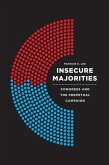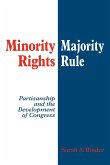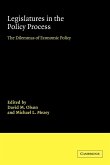When Majorities Fail is a study of institutional failure in Russia's first democratic legislature.
When Majorities Fail is a study of institutional failure in Russia's first democratic legislature. Inadequate rules and a chaotic party system combined to make it nearly impossible to pass a coherent legislative program, including a new constitution. The internal instability in Russia's parliament is known as cycling, one of the most important theoretical concepts in formal study of legislatures. There are few recorded cases of cycling in politically important settings. This book documents the presence of cyclical majorities in Russian Parliament with comprehensive case and statistical analysis, and demonstrates how the failure to adopt a new constitution led to the confrontation between parliament and president in the fall of 1993. Earlier research has shown that the design of a legislative institution is crucial in preventing cycling. The author shows how the institutional design of the parliament failed, underscoring the importance of institutional design in a democratic transition.
Review quote:
'This study illuminates an important aspect of Russia's history, and avoids the facile condemnations of Yeltsin that are too common in the literature. The work is also of significance for students of comparative presidentialism, but above all it marks a great leap forwards in our understanding of legislature behaviour. From being an abstract concept in the literature, Andrews has made cycling the centrepiece of this study and the points she makes are of relevance to students of parliamentary affairs elsewhere. Despite dealing with a complex theoretical model and applying much detailed empirical analysis of voting patterns, the work is accessible to the general reader.' Slavonica
Table of contents:
Acknowledgments; 1. Introduction; 2. Cycling in action: Russia's constitutional crisis; 3. Cycling and its consequences: a theoretical framework; 4. Institutional design and implications for majority rule; 5. Issue dimensions and partisan alliances; 6. The structure of preferences; 7. Legislative instability; 8. The dynamics of agenda control in the Russian parliament; 9. Implications of disequilibrium in transitional legislatures; References; Index.
Hinweis: Dieser Artikel kann nur an eine deutsche Lieferadresse ausgeliefert werden.
When Majorities Fail is a study of institutional failure in Russia's first democratic legislature. Inadequate rules and a chaotic party system combined to make it nearly impossible to pass a coherent legislative program, including a new constitution. The internal instability in Russia's parliament is known as cycling, one of the most important theoretical concepts in formal study of legislatures. There are few recorded cases of cycling in politically important settings. This book documents the presence of cyclical majorities in Russian Parliament with comprehensive case and statistical analysis, and demonstrates how the failure to adopt a new constitution led to the confrontation between parliament and president in the fall of 1993. Earlier research has shown that the design of a legislative institution is crucial in preventing cycling. The author shows how the institutional design of the parliament failed, underscoring the importance of institutional design in a democratic transition.
Review quote:
'This study illuminates an important aspect of Russia's history, and avoids the facile condemnations of Yeltsin that are too common in the literature. The work is also of significance for students of comparative presidentialism, but above all it marks a great leap forwards in our understanding of legislature behaviour. From being an abstract concept in the literature, Andrews has made cycling the centrepiece of this study and the points she makes are of relevance to students of parliamentary affairs elsewhere. Despite dealing with a complex theoretical model and applying much detailed empirical analysis of voting patterns, the work is accessible to the general reader.' Slavonica
Table of contents:
Acknowledgments; 1. Introduction; 2. Cycling in action: Russia's constitutional crisis; 3. Cycling and its consequences: a theoretical framework; 4. Institutional design and implications for majority rule; 5. Issue dimensions and partisan alliances; 6. The structure of preferences; 7. Legislative instability; 8. The dynamics of agenda control in the Russian parliament; 9. Implications of disequilibrium in transitional legislatures; References; Index.
Hinweis: Dieser Artikel kann nur an eine deutsche Lieferadresse ausgeliefert werden.








